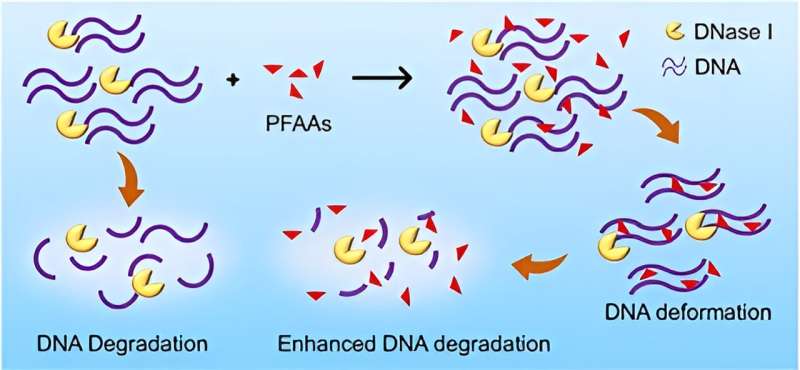
Credit: Eco-Environment & Health (2023). DOI: 10.1016/j.eehl.2023.09.002
Perfluoroalkyl acids (PFAAs), infamous for their persistence and widespread environmental presence, have long been a concern due to their toxicological impacts. However, the specific ecological consequences of their interaction with environmental DNA (eDNA) have remained largely unexplored. eDNA, the environmental gene pool, plays a crucial role in monitoring ecosystem biodiversity and assessing the ecotoxicological effects of pollutants.
Recent research published in the journal Eco-Environment & Health reveals new insights into how typical PFAAs accelerate the degradation of DNA. The study has uncovered that PFAAs, commonly known as “forever chemicals,” significantly expedite the enzymatic degradation of DNA, even at low concentrations. This discovery sheds light on the molecular ecological effects of PFAAs and underscores potential environmental risks.
The study employed modern techniques such as gel electrophoresis, ultraviolet-visible spectroscopy, atomic force microscopy and density functional theory calculations followed by symmetry-adapted perturbation theory analysis, to analyze the interaction between various PFAAs and DNA. It was observed that PFAAs bind with AT base pairs in DNA through van der Waals forces and hydrogen bonding, leading to a looser DNA structure. This alteration makes DNA more susceptible to enzymatic degradation. Notably, the effect was pronounced even at PFAA concentrations as low as 0.02 mg/L, establishing a non-linear dose-effect relationship.
Professor Lei Xiang, a leading author of the study from Jinan University, stated, “Our research provides new insights into how PFAAs interact with DNA at a molecular level. We’ve demonstrated for the first time the significant effect these substances have on accelerating DNA enzymatic degradation, a finding that could have far-reaching implications for understanding the ecological impact of these persistent pollutants.”
The findings have critical implications for understanding the ecological risks posed by PFAAs. The study’s global ecological risk evaluation revealed medium to high molecular ecological risks in several countries, including the U.S., Canada, and China, due to PFAA contamination. This highlights the urgent need for more comprehensive environmental monitoring and stricter regulations regarding the use and disposal of PFAAs.
This study serves as a wake-up call, urging scientists and policymakers to pay closer attention to the hidden ecological impacts of “forever chemicals” like PFAs. By unraveling the complex operation of molecules in our environment, we can safeguard the health of ecosystems and ensure a sustainable future for all.
More information:
Chao Qin et al, Insights into the enzymatic degradation of DNA expedited by typical perfluoroalkyl acids, Eco-Environment & Health (2023). DOI: 10.1016/j.eehl.2023.09.002
Provided by
TranSpread
Citation:
Perfluoroalkyl acids found to accelerate DNA degradation, highlighting potential ecological risks (2023, December 21)
retrieved 21 December 2023
from https://phys.org/news/2023-12-perfluoroalkyl-acids-dna-degradation-highlighting.html
This document is subject to copyright. Apart from any fair dealing for the purpose of private study or research, no
part may be reproduced without the written permission. The content is provided for information purposes only.
>>> Read full article>>>
Copyright for syndicated content belongs to the linked Source : Phys.org – https://phys.org/news/2023-12-perfluoroalkyl-acids-dna-degradation-highlighting.html










